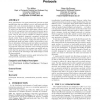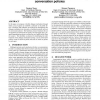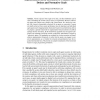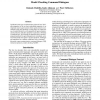122
click to vote
ARGMAS
2008
Springer
15 years 4 months ago
2008
Springer
Many practitioners view agent interaction protocols as rigid specifications that are defined a priori, and hard-code their agents with a set of protocols known at design time -- a...
121
click to vote
ARGMAS
2008
Springer
15 years 4 months ago
2008
Springer
Intelligent and autonomous software agents may engage in dialogue and argument with one another, and much recent research has considered protocols, architectures and frameworks for...
111
click to vote
ARGMAS
2008
Springer
15 years 4 months ago
2008
Springer
Practical reasoning (PR), which is concerned with the generic question of what to do, is generally seen as a two steps process: (1) deliberation, in which an agent decides what st...
100
click to vote
ARGMAS
2008
Springer
15 years 4 months ago
2008
Springer
In this paper, we propose a flexible dialogue mechanism through which a set of agents can establish a coherent set of public beliefs. Flexibility and coherence are achieved by dec...
112
click to vote
ARGMAS
2008
Springer
15 years 4 months ago
2008
Springer
Norms represent what ought to be done, and their fulfillment can be seen as benefiting the overall system, society or organisation. However, individual agent goals (desire) may con...
ARGMAS
2008
Springer
15 years 4 months ago
2008
Springer
Abstract. The purpose of this paper is to investigate how argumentation processes among a group of agents may affect the outcome of group judgments. In particular we will focus on ...
128
click to vote
ARGMAS
2008
Springer
15 years 4 months ago
2008
Springer
In virtual training scenarios, agent technology can be used to build a virtual tutor that assists a student during training. In a dialogue using argumentation schemes, the virtual ...
115
click to vote
ARGMAS
2008
Springer
15 years 4 months ago
2008
Springer
Verification that agent communication protocols have desirable properties or do not have undesirable properties is an important issue in agent systems where agents intend to commu...
146
click to vote
ARGMAS
2008
Springer
15 years 4 months ago
2008
Springer
The social laws paradigm represents an important approach to the co-ordination of behaviour in multi-agent systems. In this paper we examine the relationship between social laws an...




